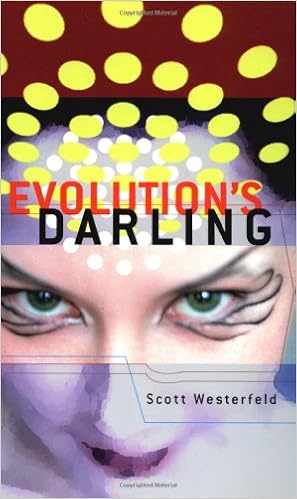|
Scott Westerfeld, Evolution's Darling (Four Walls Eight Windows, 2000) In his third SF novel, Scott Westerfeld explores the themes of machine sentience and the autonomy of copies of same. In a prologue first published in the Magazine of F&SF's March 2000 issue, the eponymous "Darling" refers to a former starship mind, an AI whose growing intimate bond with the adolescent daughter of the ship's captain allowed his Turing Quotient to exceed 1.0 -- the level at which an "artificial" is granted personhood and full human rights.
On his way to Malvir, Darling's path crosses that of Mira, an assassin working for remote and powerful bosses, "gods," whose purpose is to eliminate or suppress undesirable developments -- such as the copying of sentient machines. Mira, whose personal history was stolen by her AI bosses and replaced with a career as an assassin, gets sexually involved with the well-equipped Darling, their liason depicted in erotic, graphic sadomasochistic detail and intensity rare in SF outside of specialty small presses such as Circlet Press! These highly charged erogenous escapades with Darling trigger strange dreams that may be Mira's recovered memories, the key to unlocking her life before becoming a high-tech killer. Darling's and Mira's quests become entwined on planet Malvir where an entity called the Maker (a sort of dupicating self-aware machine with aspirations of becoming a sculptor), copied another sentient construct named Oscar Vale to see whether it could, copied Vaddum and then exploded a copy of itself -- the Blast Event! -- when Malvir's planetary AI detected it. Still other copies, however, remain to be confronted. Westerfeld is an excellent prose stylist, evoking worlds of sensual decadence inhabited by intriguing if not always lovable characters. His depictions of the enhanced sensory capabilities of his sentient machine and physically augmented assassin protagonists and how their perceptions affect their emotions wax nothing short of poetic. The vivid narrative is structured in short segments, shifting focus to follow the story from different points of view, also including flashbacks and detached background descriptions. The fast pace never slows, requiring some effort to keep track of plot developments, as the reader encounters engrossing ideas, (especially about far future, high-tech art production), morbidly fascinating rough sex and bizarre personalities -- human, non-human and AI -- interacting in this raw, invigorating, cutting-edge -- bordering on avant-garde -- tale of a constructed awareness in search of itself and what it means to have a soul. 
|
 Rambles.NET book review by Amy Harlib 7 May 2000 Agree? Disagree? Send us your opinions!  



 |

